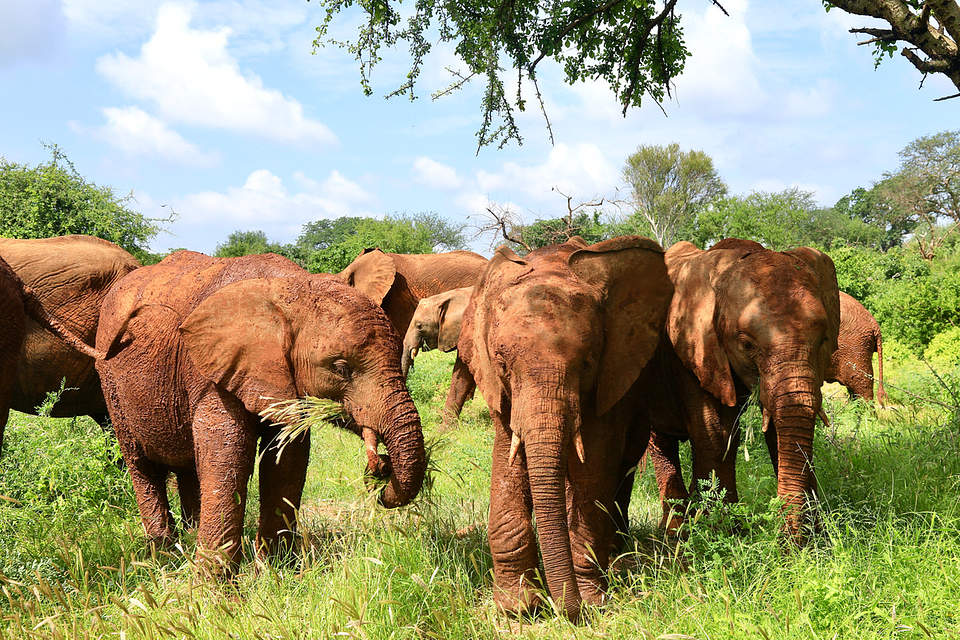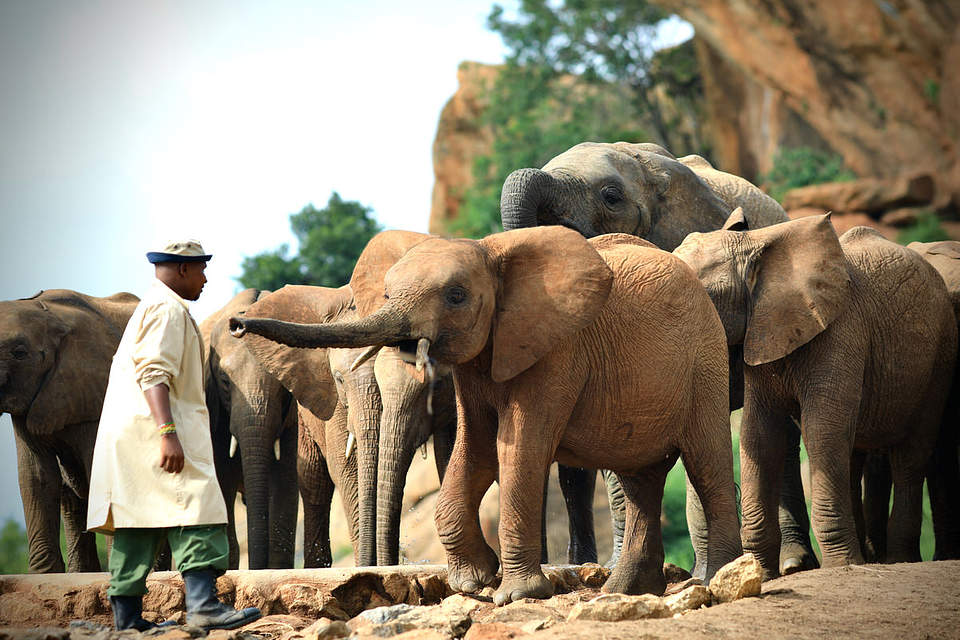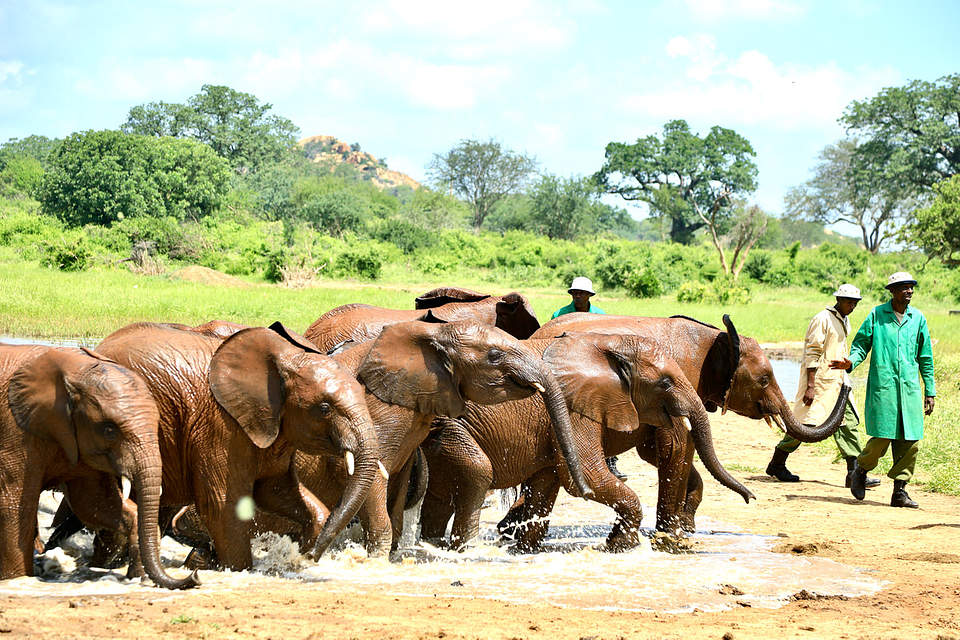We typically do graduations in batches, so friends groups from the Nursery can form a little gang in their new home.
Thus, on the morning of 8th December — two days after Ahmed, Tingai, and Taabu graduated from the Nursery — Rafiki, Kitiak, and Elerai made the same journey, moving to our Ithumba Reintegration Unit in Tsavo East National Park.
The trio of bulls had made it clear that they were ready to move on from the Nursery. Kitiak started taking long walkabouts away from the Nursery herd, often looping the other graduates into his excursions. Elerai, always a loner, seemed a bit bored with the Nursery youngsters. And Rafiki, as is typical of growing bulls, had started throwing his weight around. All these behaviours are telltale signs that orphans have outgrown the coddled Nursery stage, craving broader horizons, increased independence, and the company of older elephants.

Kitiak, Elerai, and Rafiki couldn't believe the green bounty that greeted them
The graduates pulled into Ithumba just before 9 o’clock in the morning. Rafik walked out of the translocation truck first, calm and confident. Elerai, who was in the middle, was a bit reluctant to emerge. Only after Kitiak stepped out did he follow. Showcasing their independent spirit, the boys finished their milk bottles, headed to the water trough for a drink, and then took it upon themselves to start exploring. The Keepers had to work quickly to direct them back towards the stockades!
We didn’t want them to wander too far, because the boys had a surprise waiting for them: Taabu, Tingai, and Ahmed, their Nursery friends, were brought over to welcome them to Ithumba! They had only been apart for two days, but the happiest reunion ensued.

Kitiak introducing himself to the Ithumba Keepers
Kindani, Kinyei, Bondeni, Naleku, and Olorien then jogged back to the stockades to join the celebrations. Greetings exchanged, we brought the rest of the Ithumba herd over. For most of the orphans, Kitiak, Rafiki, and Elerai are entirely new faces. But still, everyone was so open-hearted, happy, and excited to welcome their new friends into the fold.
The first day passed in a wonderful blur. At the mud bath — where the rains have transformed the wallowing pool into a veritable pond — Kitiak unexpectedly led the charge into the water. He somehow found himself the leader and went right into the centre of the pond, with every elephant following. When he could no longer stand in the deep water, he lost his wits and made a frantic turn back to shore. The other orphans duly followed, creating an elephant whirlpool! Come nightfall, they retired to Class One, where they share a room with Ahmed, Tingai, and Taabu.

Rafiki, meeting friends old and new
These three graduates were rescued in 2022, all on the older side. Rafiki has an extraordinary story, in that he actually sought out help. He hails from Samburu, in northern Kenya. After his mother was killed in human-wildlife conflict, he travelled to a nearby safari camp and waited outside the tents until a rescue was mounted. His name — which means ‘friend’ in Swahili — is both a nod to his origin story and a testament to his outgoing, friendly character.
When he was first spotted alone on the plains of Amboseli, Elerai painted a deceiving picture: He had large, robust tusks, which initially made it easy to mistake him for a much older elephant. A closer look, however, revealed that he was actually very young and very vulnerable. He arrived at the Nursery in a dire state, riddled with parasites and gripped by edema. Elerai spent a long time healing inside his stockade, until little by little, everything began to right itself.
Like Elerai, who we rescued a few weeks prior, Kitiak painted a deceiving picture: He had unusually large tusks for his age, which made him look older and less fragile than he actually was. More troubling were the injuries on his body: He bore several arrow wounds, no doubt inflicted in human-wildlife conflict. At the Nursery, he emerged as a shy and stoic bull, happiest when doing his own thing or browsing quietly with his friends.

After a fun-filled swim, Elerai led the way to the next activity
We are delighted that we were able to give these brave young bulls the second chance they deserve. Over the coming months and years, side by side, they will work their way back to the wild.
An Addendum:
On 10th December, our graduates’ story took an unexpected twist: In the early morning some kudus leapt out of the underbrush, taking the orphan herd by surprise. Caught off guard, everyone took off in different directions. When the Keepers called, the orphans slowly filtered back — all but Ahmed, Tingai, Taabu, Kitiak, Elerai, and Rafiki, who did not return.
A team of Keepers immediately began to search for them, calling for them all the while and searching for their tracks in the mud. Tracking them was a difficult task: Ithumba is a green, tangled jungle after spectacular rains, and while the elephants moved easily through the landscape, it was significantly harder going for the humans attempting to follow them.
At first, the Keepers weren’t overly panicked and felt sure everything was in hand. But then, the tracks indicated that the six were covering ground and moving away from the rest of the herd. The SWT helicopter and fixed-wing aircraft were mobilised to the scene. They flew transects for the rest of the afternoon, painstakingly crisscrossing the area the Keepers felt sure they had gone. Ithumba and the northern area of Tsavo has quite literally thousands of elephants at present, which makes this a challenging undertaking.
By nightfall, despite a combined 12 hours of flying and extensive ground searching, the babies still hadn’t been located. The Keepers, particularly Ithumba Head Keeper Benjamin, are extremely stressed by these events, feeling responsible for losing the babies. Our Keepers walked 30 kilometres on foot that day, searching for the missing orphans, but a late afternoon rainstorm erased the elephants’ tracks. At first light, the pilots resumed their search. Between now and then, they have logged more than 26 hours in the aerial search.
While an aerial perspective offers obvious advantages in this sort of mission, tracking conditions are incredibly challenging at the moment. Ithumba has turned into a profusion of thick vegetation, capable of shrouding even the biggest bull. This sector of the park is also teeming with elephants right now, making it very difficult to differentiate our little sextet from the hundreds in the area.
As yet, we have not located our six graduates. While we are very anxious for them to come home, we feel optimistic that they are faring well. Conditions are extremely favourable conditions right now, with a bounty of food and water at every turn. There are also lots of ex-orphans and wild herds in the area, who will no doubt welcome our little group into their midst. And we feel very heartened by the knowledge that they have a confident, capable leader in Ahmed, the only female of the group.
Finally, we are mindful that Ahmed, Kitiak, Elerai, and Rafiki were all living wild for longer than they were in our care. They have strong wild instincts and were always very self-sufficient, even at the Nursery. Taabu and Tingai were rescued a bit younger, but they have grown into two very assured, independent bulls. We know that their friends — and, if our suspicions are correct, the ex-orphans and wild friends they collect along the way — will look after them.
We feel certain that this story isn’t over yet. We will share updates as and when we have them — but in the meantime, it's important to reassure ourselves that elephants look after each other in such favourable times, food and water are bountiful, and all six are very self-reliant, competent individuals. More to come!
